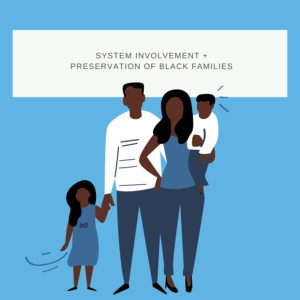 As an early career mental health therapist, I worked predominantly with Black families with children who were involved in the “system” Most referrals for mental health evaluations and therapy came directly from the county for children working with child protective services (CPS) or juvenile probation. Other referrals came from schools or community-based settings. I saw Black families disproportionately involved with CPS, probation, and out-of-home foster placements. Although the focus was on “early intervention”, many individuals and families were in a state of crisis with the impact of multiple stressors and systems involvement.
As an early career mental health therapist, I worked predominantly with Black families with children who were involved in the “system” Most referrals for mental health evaluations and therapy came directly from the county for children working with child protective services (CPS) or juvenile probation. Other referrals came from schools or community-based settings. I saw Black families disproportionately involved with CPS, probation, and out-of-home foster placements. Although the focus was on “early intervention”, many individuals and families were in a state of crisis with the impact of multiple stressors and systems involvement.
My heart hurt to see children removed from their homes. Many children did not understand why they were being removed and were losing ties with their families, sense of self/ belonging, and culture. Even more painful was to hear stories about abuse within foster placements. On the other hand, I’ve seen the opposite where there was culturally responsive supportive coordination of care among workers, placements that maintained cultural & community ties, and children able to thrive in their new environment and/ or effectively reunite. This gave me hope for positive change in a broken system.
Minnesota ranks as one-of-the-best-places-to-live-unless-you-are-black. Think about the discrepancies of trying to live one’s best life while experiencing some of the worst economic, educational, and racial discrimination as a Black Minnesotan. Consider wanting to seek out a safe place to process these experiences and how this will feel with your provider. If you prefer a culturally specific match such as a Black therapist, it can take time to get connected due to underrepresentation in the field. In Minnesota, only 2% of mental health professionals are Black. At CARE, we are working hard to address some of the systemic barriers by helping more BIPOC students pursue careers in therapy as well as providing high-quality training and supervision to therapists.
Being immersed in the Black community and being outside my own comfort zone in others’ homes or the community setting gave me many opportunities to challenge and confront my own areas of discomfort and bias. Through training and personal experiences, I did a lot of reflection on how I would feel if roles were reversed. How would I feel about going to therapy if someone told me I or my child needed therapy as a requirement, such as a person in a position of power in the school or legal system as part of my care plan?
In Minnesota, a black child is 3Xs more likely to be reported to child protection and removed from their home than a white child. Many of these children move through CPS to the juvenile detention system. The rates of Black and Native American children continue to be overrepresented in Minnesota’s child welfare system with significant systemic disparities, and Minnesota-legislature-again-fails-to-pass-bill-defending-black-families. There is a renewed-push-for-the African-American-Family-Preservation-Act. This would help provide culturally grounded resources to support and strengthen Black families and have standards around removals and out-of-home placements. To learn more and become involved see preserveourfamilies.org.
Written By: Charlotte Johnson, MA, LPCC
We’re Here to help
Our wellness experts will be happy to take care of you. You can CLICK HERE to schedule an appointment now or call (612)223-8898.
Meet Clinicians
We’re united by our commitment to providing effective, relevant, and innovative mental health support at all stages of your journey. Click Here to find a therapist or find out more about who we are, where we come from, and how we live out CARE’s mission every day.
The professionals at CARE are actively collecting and creating resources to help with what you need and address frequently asked questions. We’re Here for You.



